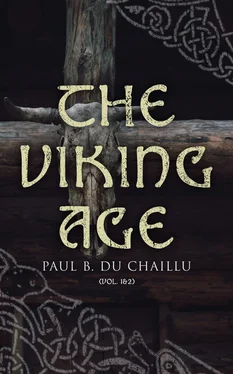When the burning did not take place, the warrior was buried with his weapons and entire equipment. Sometimes he slept with his sword under his head. Angantyr’s shoulders rested upon the famous sword Tyrfing , and Angrim’s sons were buried there in that manner. Many of the weapons placed with them were very famous and supposed to possess special or supernatural qualities, and mounds were sometimes broken for the sake of getting.
“A little after she (the Amazon Hervör) left by herself in a man’s dress and weapons and went to Vikings, and was with them for awhile, and was called Hervard. A little after the chief of the Vikings died, and Hervard got the command of them. Once they came to Sámsey. Hervard went up on land, and none of his men wanted to follow him, for, they said, it would not do for any man to stay out there at night. Hervard said that much property was likely to be in the mounds, and went up on the island near sunset. They lay in Munarvag. She met a herd-boy there, and asked him about news. He said, ‘Dost thou not know the island? Come home with me, for it will not do for any man to stay out here after sunset; I am going home at once.’ Hervard replied: ‘Tell me; where are the mounds of Hjörvard?’ The boy said: ‘Thou art unwise, as thou wantest to search for that at night which few dare search for at mid-day; burning fire plays on the mounds after sunset.’ Hervard replied he would certainly go to the mounds. The shepherd said: ‘I see that thou art a bold man, though thou art unwise. I will give thee my necklace if thou wilt come home with me.’ Hervard answered: ‘Though thou wouldst give me all thou ownest thou couldst not hinder me from going.’ When the sun set they heard hollow noises in the island, and the mound fires appeared. The shepherd got frightened and took to his feet, and ran into the forest as quickly as he could, and never looked back.”
As she comes by the mound she sings:—
Awake, Angantyr!
Hervör thee rouses,
The only daughter
Of thee and Svafa;
Yield to me from the mound
The sharp sword
Which the Dvergar
For Svafrlami forged.
Hjörvard! Hervard!
Hrani! Angantyr!
I awaken you all
Beneath the tree-roots,
Who are clad in
Helmet and coat of mail
With shield and sharp sword,
And reddened spear.
Sons of Arngrim!
Much harm doing,
Much have you
The mould increased,
As no one
Of the sons of Eyfura
Will speak to me
At Munarvag.
Hjörvard! Hervard!
Hrani! Angantyr!
So be the mind
Of you all
As if you were rotting
In an ant-hill
Unless ye yield
The sword forged by Dvalin;
It is not fit for ghosts
Costly weapons to hide.
Angantyr.
Hervör, my daughter!
Why callest thou thus
Full of baneful words;
Thou art going to fare badly;
Mad hast thou become
And out of thy senses,
Mind-bewildered,
As thou awakenest the dead.
Neither father buried me
Nor other kinsmen;
The two who lived
Kept Tyrfing ;
Although at last
One became its owner.
Hervör.
Thou dost not tell me truth;
The As shall leave thee
Unharmed in the grave-mound
If thou hast not Tyrfing;
Thou art unwilling
To give the heritage
To thy only child.
Then the mound opened and looked as if it were all on fire and flame.
Angantyr sang:
Ajar is the gate of Hel;
The mounds are opening,
All the island-coast
Looks as if on fire;
Outside all
Is awful to behold;
Hasten thee, maiden, if thou canst,
To thy ships.
Hervör.
Ye can not light
Such a flame at night
That I would
Fear your fires;
The mind-town of thought 204
Of the maid does not quail
Though she sees a ghost
Standing in the door.
Angantyr.
I will tell thee, Hervör,
Listen the while,
Wise daughter,
What will happen;
This Tyrfing will,
If thou canst believe it,
All thy kin,
Maiden, destroy.
Thou shalt beget a son
Who afterwards will
Tyrfing carry
And trust to his own strength;
This one will the people
Heidrek call,
He will be the mightiest born
Under the tent of the sun.
Hervör.
I thus spellbind
The dead champions
That you shall
All lie
Dead with the ghosts,
Rotting in the mound,
Unless thou yieldest me, Angantyr,
The slayer of Hjalmar, 205
The one to armours dangerous,
Out of the mound. …
Angantyr.
Young maiden, I say,
Thou art not like man
As thou art strolling about
Among mounds in the night
With inlaid spear
And the Goth’s metal,
With helmet and mail-coat
Before the hall-door.
Hervör.
I thought hitherto I was
A human being
Ere I called
At your halls;
Hand me from the mound
The hater of mail-coats, 206
It will not do for thee
To hide the Dvergar’s smithying.
Angantyr.
The slayer of Hjalmar
Lies under my shoulders;
All around it is
Wrapped in fire;
No maiden I know
Above the mould
That dares this sword
Take in her hand.
Hervör.
I will hold
And take in my hands
The sharp mœkir
If I may have it;
I do not fear
The burning fire;
At once the flame lessens
When I look at it.
Angantyr.
Foolish art thou, Hervör,
Though courage owning,
As thou with open eyes
Into the fire rushest;
I will rather yield thee
The sword from the mound,
Young maiden!
I cannot refuse it to thee.
Then the sword was flung out into the hands of Hervör.
Hervör.
Thou didst well,
Kinsman of vikings,
When thou gavest me
The sword from the mound;
I think, king!
I have a better gift
Than if I got
The whole of Norway.
Angantyr.
Thou knowest not,
Thou art wretched in speech,
Imprudent woman,
At what thou art glad.
This Tyrfing will,
If thou canst believe it, 207
All thy kin,
Maiden, destroy.
Hervör.
I will go down
To the steeds of the sea; 208
Now is the king’s daughter
In a good mind;
I fear little,
Kinsman of chiefs,
How my sons
May hereafter quarrel.
Angantyr.
Thou shalt own it
And enjoy it long,
But hidden keep
The slayer of Hjalmar;
Touch thou not its edges,
Poison is in both,
This doomer of men
Is worse than disease.
Farewell, daughter,
I would quickly give thee
The vigour of twelve men
If thou would’st believe it; 209
The strength and endurance,
All the good
That the sons of Arngrim
Left after themselves.
“Then she went down to the sea, and when it dawned she saw that the ships had left. The vikings had been afraid of the thunderings and the fires in the island” 210(Hervarar Saga, c. 10).
Burial in ships. —The mode of burial in ships would appear to have belonged exclusively to the North, where it seems to have been in much favour, and shows in a remarkable manner the seafaring character of the people.
Until recently few descriptions have been more ridiculed by persons who did not believe in the Saga literature, than those which gave accounts of burials of chiefs, warriors, and others in ships. Here again archæology has come to our aid to prove the truthfulness of the Sagas, and in such a perfect manner as to settle the question beyond controversy; for we find ships in which the body of the dead warrior was not burned, and other ships which have been used as a pyre. The earliest account of such burial is in Voluspa, amplified in the later Edda, which gives us a vivid description of the funeral of Baldr, the son of Odin.
Читать дальше












